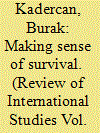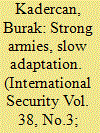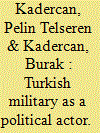|
|
|
Sort Order |
|
|
|
Items / Page
|
|
|
|
|
|
|
| Srl | Item |
| 1 |
ID:
123401


|
|
|
|
|
| Publication |
2013.
|
| Summary/Abstract |
The assumption that 'states' primary goal is survival' lies at the heart of the neorealist paradigm. A careful examination of the assumption, however, reveals that neorealists draw upon a number of distinct interpretations of the 'survival assumption' that are then treated as if they are the same, pointing towards conceptual problems that surround the treatment of state preferences. This article offers a specification that focuses on two questions that highlight the role and function of the survival assumption in the neorealist logic: (i) what do states have to lose if they fail to adopt self-help strategies?; and (ii) how does concern for relevant losses motivate state behaviour and affect international outcomes? Answering these questions through the exploration of governing elites' sensitivity towards regime stability and territorial integrity of the state, in turn, addresses the aforementioned conceptual problems. This specification has further implications for the debates among defensive and offensive realists, potential extensions of the neorealist logic beyond the Westphalian states, and the relationship between neorealist theory and policy analysis.
|
|
|
|
|
|
|
|
|
|
|
|
|
|
|
|
| 2 |
ID:
115223


|
|
|
|
|
| Publication |
2012.
|
| Summary/Abstract |
This essay aims to make a contribution to the conversation between IR and nationalism literatures by considering a particular question: What is the relationship between interstate military competition and the emergence of nationalism as a potent force in world politics? The conventional wisdom among international security scholars, especially neorealists, holds that nationalism can be more or less treated like a "technology" that allowed states to extract significant resources as well as manpower from their respective populations. This paper underlines some of the problems involved with this perspective and pushes forward an interpretation that is based on the logic of political survival. I argue that nationalism's emergence as a powerful force in world politics followed from the "mutation" and absorption of the universalistic/cosmopolitan republican ideas that gained temporary primacy in Europe during the eighteenth century into particularistic nationalist ideologies. This transformation, in turn, can be best explained by the French Revolution's dramatic impacts on rulers' political survival calculi vis-à-vis both interstate and domestic political challenges. The analysis offered in this essay contributes to our understanding of the relationship between IR and nationalism while also highlighting the potential value of the political survival framework for exploring macrohistorical puzzles.
|
|
|
|
|
|
|
|
|
|
|
|
|
|
|
|
| 3 |
ID:
158440


|
|
|
|
|
| Summary/Abstract |
How did the rise of nationalism affect patterns of interstate wars? The conventional wisdom in mainstream security studies tends to treat the rise of nationalism as a ‘force amplifier’ that allowed states to wage war on an unprecedented scale, leading to deadlier—and, consequently, less frequent—wars. By building on emerging interdisciplinary research on territory and territoriality, this essay suggests that there was a second mechanism—complementary to the ‘force amplifier’ logic—through which the rise of nationalism affected the patterns of interstate war: nationalism changed the ‘character’ of territories in the modern state system, which, in turn, transformed state preferences over their territorial belongings. Before the rise of nationalism, state elites viewed their territories more as ‘divisible’ goods, which created strong incentives for states to wage frequent yet limited wars. The rise of nationalism, in this context, rendered territory controlled by a state more of an ‘inviolable homeland’, which then contributed to the increasing severity and decreasing frequency of interstate wars. The arguments presented in this essay have implications for not only the study of nationalism and war, but also bargaining models of war and the so-called ‘border fixity’ norm.
|
|
|
|
|
|
|
|
|
|
|
|
|
|
|
|
| 4 |
ID:
127891


|
|
|
|
|
| Publication |
2013.
|
| Summary/Abstract |
Why are some states more willing to adopt military innovations than others? Why, for example, were the great powers of Europe able to successfully reform their military practices to better adapt to and participate in the so-called military revolution of the sixteenth and seventeenth centuries while their most important extra-European competitor, the Ottoman Empire, failed to do so? This puzzle is best explained by two factors: civil-military relations and historical timing. In the Ottoman Empire, the emergence of an institutionally strong and internally cohesive army during the early stages of state formation-in the late fourteenth century-equipped the military with substantial bargaining powers. In contrast, the great powers of Europe drew heavily on private providers of military power during the military revolution and developed similar armies only by the second half of the seventeenth century, limiting the bargaining leverage of European militaries over their rulers. In essence, the Ottoman standing army was able to block reform efforts that it believed challenged its parochial interests. Absent a similar institutional challenge, European rulers initiated military reforms and motivated officers and military entrepreneurs to participate in the ongoing military revolution.
|
|
|
|
|
|
|
|
|
|
|
|
|
|
|
|
| 5 |
ID:
148613


|
|
|
|
|
|
|
|